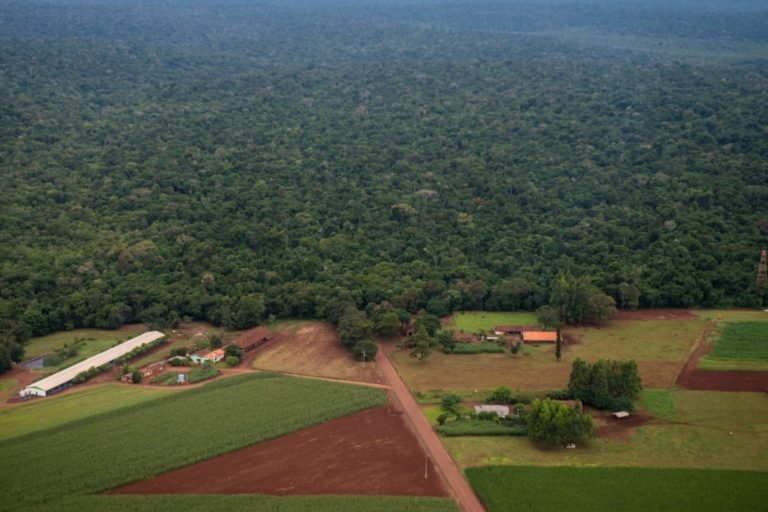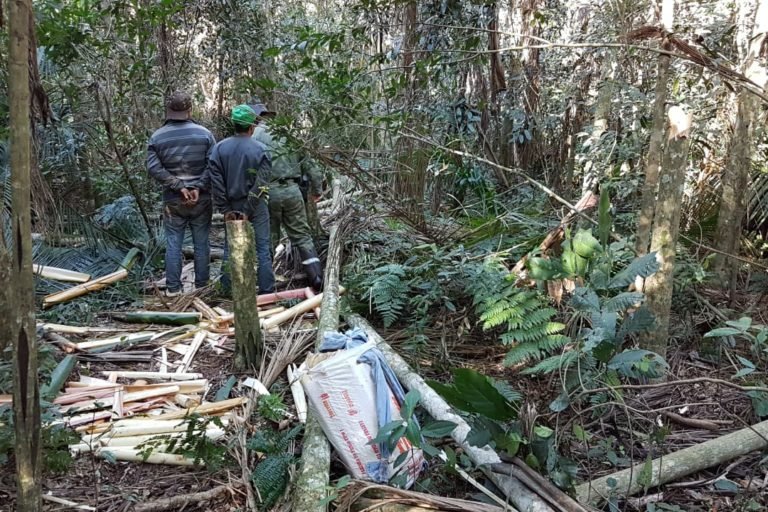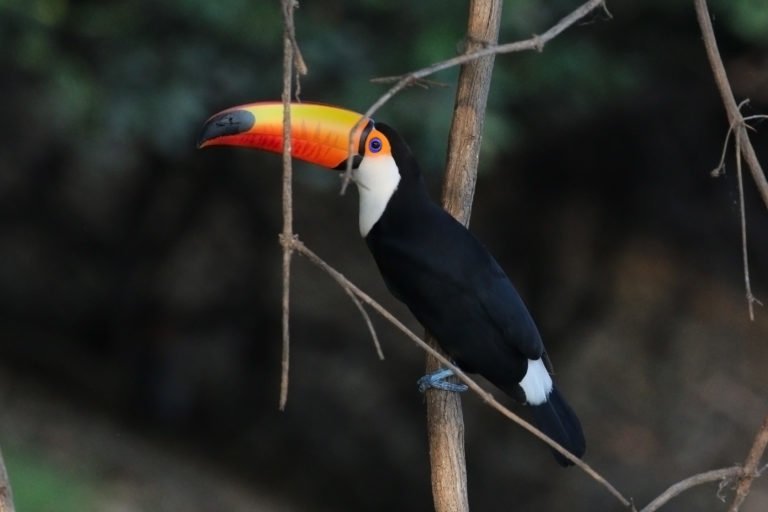- A recent study validates environmental groups’ concerns that reopening a long-closed road through Brazil’s Iguaçu National Park would lead to an increase in environmental violations in the protected area.
- Two bills currently before Congress call for reopening the Estrada do Colono, or Settler’s Road, which was shut in 2001 and has since been reclaimed by the jungle.
- The study found that reopening it would expose at least 10,000 hectares (25,000 acres) of the park, which is a UNESCO World Heritage Site, to wildlife poaching, illegal fishing, and extraction of juçara palm heart.
- Between 2009 and 2019, more than 1,300 notices of environmental violation were issued in the park; with the road reopened, the study projects a 10% increase in illegal fishing and a nearly 15% increase in palm heart harvesting.
The Iguaçu Falls, the largest in the world, sit on the border between Brazil and Argentina and are protected by national parks in both countries. Located in Brazil’s Paraná state, Iguaçu National Park spans 185,000 hectares (457,000 acres), has been designated a UNESCO World Heritage Site, and is what’s known locally as an integral protection conservation unit — created to preserve one of the most significant remnants of the Atlantic Forest. Hunting, fishing and other forms of natural resource exploitation are banned in areas with this preservation status.
Nevertheless, between 2009 and 2019, environmental authorities issued more than 1,300 notices for a range of violations in the park, including poaching of wildlife and harvesting of palm hearts from a threatened native palm tree, juçara (Euterpe edulis).
Experts say these crimes could increase if either one of two bills — known as bills 7123/2010 and 984/2019 — currently being deliberated in the lower house of Congress is approved. The latter was introduced by Nelsi Coguetto Maria, a congressman popularly known as Vermelho, and openly backed by President Jair Bolsonaro.
Both bills call for reopening the Estrada do Colono (Settlers’ Road), which cuts through Iguaçu National Park from north to south, to create a new type of conservation unit in Brazil: a parkway. The road has been closed since 2001 by order of the country’s Superior Court of Justice.
Built in the 1950s, the road runs 17.6 kilometers (10.9 miles). It connects the municipalities of Serranópolis do Iguaçu, with a population of approximately 5,500, to Capanema, with just over 19,000 residents.
Since its closure, the road has been almost entirely reclaimed by the vegetation, and reopening it remains a contentious issue in the region. Environmental organizations oppose it, warning of the impact that an influx of vehicle traffic and people will have on the park’s jaguar (Panthera onca) population, the only one that’s on the rise in the Atlantic Forest.
Vermelho, though, says reopening the road “will correct a historic injustice” and cater to the “decades-long social clamor of the people of Paraná, reestablishing the region’s history and its socioeconomic, environmental and tourist relations.”
In an effort to inform the ongoing debate, a group of researchers decided to measure the impact that vehicles circulating again on the Estrada do Colono could have on environmental violations in the park.
“Our main goal was to measure its potential effects on the main role played by Iguaçu National Park, that is, integral protection of biodiversity,” says Neucir Szinwelski, a biology professor at Western Paraná State University (Unioeste) and a co-author of a study published earlier this year in Environmental Research Letters.

Ten thousand hectares open to violations
For their study, the researchers employed a statistical model. Most environmental violations occur along the roads that surround the park, as well as near rivers and flatter terrain.
“We already know that these areas are more susceptible to [environmental] crimes, since moving within the forest is difficult,” says study lead author Victor Mateus Prasniewski, a doctoral student in the Ecology and Biodiversity Conservation Program at the Federal University of Mato Grosso (UFMT).
The researchers used data from several sources, such as the inspection department at ICMBio — an agency under the Ministry of Environment that administers national parks in Brazil — as well as the ranger corps in the adjoining Iguazú National Park in Argentina. They compared records on four types of environmental violations over the past decade: poaching, illegal camping, fishing, and palm heart extraction. They then modeled the trend if the Estrada do Colono were in operation and therefore making more of the protected area accessible to would-be violators.
“All the scenarios we modeled show an increase in crime rates,” Szinwelski says. “If the road is reopened, a 10,000-hectare [25,000-acre] area around it will be more susceptible to poaching, illegal fishing and palm heart extraction. Opening a road in that area is totally impractical. The vegetation has regenerated completely and there is no basis for reopening. We know species will be impacted.”

All small and medium-sized mammals would come under greater threaten, Szinwelski says. This includes not only jaguars but also dozens of other species, such as pumas (Puma concolor), agoutis (Dasyprocta leporina), pacas (Cuniculus paca), collared peccaries (Pecari tajacu), lowland tapirs (Tapirus terrestris), and deer and wild pigs. Szinwelski also says there would be higher risk to birds such as toucans, guans and macaws being poached for the illegal wildlife trade.
Aquatic species would also be impacted by the reopening of the road, according to the study. It projected a 10% increase in illegal fishing, along with a nearly 15% increase in illegal harvesting of palm heart.
“When you open a road, access becomes easier. Bill 984/2019 calls for the creation of a regular rural road, so it will be freely accessible,” Prasniewski says.

Supplying the illegal market
Hunting is part of the culture for several rural communities and is still considered acceptable, especially by older generations.
“Many of the violators arrested by the police are 50-65 years old,” Szinwelski says. “They have always hunted, and they continue to hunt. The cultural aspect is very clear here. People go there just for the pleasure and enjoyment of that activity. They set up a camp, cut a palm tree for its heart, kill an animal and eat it right there or bring it home, and that’s it.”
But these activities, along with fishing, are known to supply an illegal market for products considered delicacies by wealthy consumers with no concern for the law.
That is, the animals are killed for their meat. According to Szinwelski, locals say a paca, a cat-sized rodent, can sell for between 800 and 1,000 reais (about $150-$200), and a deer for up to 2,000 reais (about $380).
“Poachers prefer to take the risk of being arrested — which may not happen — if they can make the minimum monthly wage or even more in one night’s hunt,” Szinwelski says.
What makes the prospect of reopening the Estrada do Colono even more worrying is the proliferation of guns in the general populace in recent years. Since Bolsonaro took office as president at the start of 2019 and promoted a pro-gun policy encouraging all Brazilians to carry a firearm, there’s been a 333% jump in new gun registrations for the category of hunters, marksmen and firearms collectors. In 2021 alone, there were more than a quarter of a million new gun registrations, up from less than 60,000 in 2018, the year before Bolsonaro took office.
With more weapons in people’s hands, and the prospect of a road being reopened that will increase the vulnerability of wildlife in Iguaçu National Park, it will be almost impossible for this UNESCO World Heritage Site to fulfill its core function: protecting biodiversity.
Banner image: Aerial view of Iguaçu National Park. Image by Maury Santos via Wikimedia Commons (CC BY-SA 4.0).
This story was reported by Mongabay’s Brazil team and first published here on our Brazil site on July 18, 2022.
Citations:
Prasniewski, V. M., Szinwelski, N., Bertrand, A. S., Martello, F., Brocardo, C. R., Cunha, J., … Sobral-Souza, T. (2022). Brazil’s Iguaçu National Park threatened by illegal activities: Predicting consequences of proposed downgrading and road construction. Environmental Research Letters, 17(2). doi:10.1088/1748-9326/ac4e39











